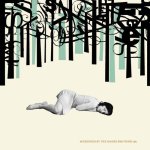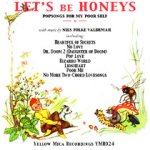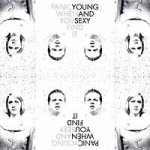7 Music Reviews
Black Moth Super Rainbow, Lost, Picking Flowers in the Woods (Graveface)

Armed with Moogs and vocoders, the Pittsburgh band Black Moth Super Rainbow is back with more of their trippy space-age music. The 9-track, mostly instrumental Lost, Picking Flowers in the Woods CD takes them further out into the galaxies than their excellent 2004 album Start a People. The childlike pop playfulness of that album has been channeled into a slow, dreamlike stroll through the imagination. The music is all colors and moods, layers of keyboards evoking, at once, a gentle mystification with the world around us, a bouncy sort of optimistic feeling, and a longing for the freshness of childhood and the prospects of tomorrow. Their music stirs up references to Stereolab, to theme music for sci-fi movies and children's TV shows, to space-rock experimenters, and more. It's a bright, loving cloud burst of color, and also rollicking, melodic, and full of life: call it lite brite funk. - dave heaton
Fax, Primario (Static)

With Primario, electronic musician Fax is increasingly focusing on atmosphere, but the sounds he creates are still diverse, still textured, still percussive. Pop vocals from Alex Ayuli of AR Kane give the first track "Soulsong" an emotional hook. The same happens later on "Passage," beginning with Ayuli whispering his vocals, a tactic that's in tune with the album as a whole, which often feels like a whisper. Ayuli sings, "open up the door / and walk into the sky." The whole album has a feeling of centering, of meditation on where you are in the world around you. Much of the album is gentle, and some of it is quite spacey, like "Tunnel (Para F)," where Fax is in the realm of In a Silent Way era Miles Davis, populating the music with moody organs and ghosts. Primario often feels in spirit like silence, but underneath that demeanor it's also busy, with rhythms and beats at the bottom, and melodies appearing out of the blue. The childhood photos on the cover suggest introspection, and it's in the music too. There's emotional depth here, and musical growth. - dave heaton
The Moore Brothers, Murdered By the Moore Brothers (Plain)

San Francisco duo the Moore Brothers catch your ear first for the way they sing together. Their latest CD Murdered by the
is filled with crystal-clear, pretty harmonies, in the vein of traditional folk music, and of those who have followed in its wake (Simon and Garfunkel being an obvious touchstone). Their music at first listen seems unfailingly heartfelt opening track "Wish You'd Say," one of the album's highlights, is a open-hearted, simple-as-it-seems love song. As it goes on there, you begin noticing how anxiety and gloom are woven through it all. Songs like "Star of Confusion" and 'Somewhere at Terror" keep the '50s optimism intact in their vocals, but offers plenty of moroseness and apocalyptic terror at the same time. Sometimes it's hard to tell which is genuine, the sweetness or the darkness the answer often seems like both, or neither. dave heaton
Tara Jane O'Neil, A Raveling EP (Acuarela)

A Raveling is a lovely little EP from Louisville musician Tara Jane O'Neil (ex-Rodan, Retsin, The Sonora Pines), released on a Spanish label that specializes in lovely little EP. O'Neil's voice floats so lightly it seems about to disappear, yet in its own quiet way still has the power to hold you still, at attention. The music here is gentle and filled with atmosphere. On opening track "All Mine Eyes" a blanket of guitars slowly expands to immerse us. On "Don't Slip" and "Pretty D," it's starker, but still soft, guitars and other stringed instruments that occasionally bend in the direction of dreams, other times conveying hope and hurt through the smallest of strokes. A Raveling ends with a cover of Judee Sill's "The Phoenix," played straight and gorgeous for it. - dave heaton
Let's Be Honeys, Popsongs For My Poor Self (Yellow Mica)

Popsongs For My Poor Self has an instantly tropical feeling to it - the first seconds light up my mood like I've been transported somewhere warm and sunny. And hey, Let's Be Honeys is from Sweden, even. Maybe that vacation aura is from the instruments - the ukulele, the tambourine, the handclaps and fingersnaps. Or maybe it's the sheer optimism in Nils Folke Valdemar's singing. That's part and parcel with the positivity of the music overall, and of the songs themselves. Valdemar believes in love, and he believes in music, and for him these two go hand in hand. These eight songs embody the notion that there's nothing better in life than listening to music you love with a person you love, except for maybe making that music yourself. The world can be changed by a pop song when it's fueled by love, Let's Be Honeys assert. That'd be all well and good, pleasant dreams and nothing more, if Let's Be Honeys' own songs weren't so great - fun and catchy and attractive. Those qualities make the romantic notions real, They make it ever the more touching when Valdemar sings about a crush or the search for love. They make the importance of a simple pop song real. Popsongs for My Poor Self's title is too humble - these are songs for everybody. - dave heaton
Wordsworth, Mirror Music: Deluxe Edition (Halftooth)

Wordsworth can rap, I know that much. He's shown his skills here and there for near a decade now, from showing up on tracks by A Tribe Called Quest and Black Star to being all over that sometimes clever MTV freestyle show Lyricist's Lounge. He has a word-fast, nimble style, similar in tone to Kweli and Eminem. Listen to almost any song on his album Mirror Music, and you'll agree that he has skills...but you won't be overwhelmed, won't be spellbound, won't feel caught up in his flow. Listen to more than one song, and you'll soon be worn down, by how lackluster the beats are, by how similar the songs are all to each other, by how awkward all of the hooks and choruses sound. The thing is, this is Mirror Music. That is, it's autobiography, it's one man writing about his life. On every track Wordsworth sounds heartfelt about all else, but in the process of testifying to personal growth and detailing struggles, it's like he's forgotten about everything else, everything that makes this music and not just a mirror. I'm sure this music means so much to him - that's why two years after the album's release it's back in this "deluxe" form, with a second disc of decent but not all that great remixes. And I'm sure it means a lot to other people, though who relates to his lyrics or respect his speaking from the heart. But it's missing a spark that would make it mean all that much to me, or make me want to listen to it again, even. - dave heaton
Young and Sexy, Panic When You Find It (Mint Records)

The cover layout for the third Young and Sexy album is austere, in black and white. And the music is similarly stark. It's less overtly bright than the previous two albums (2002's Stand Up for Your Mother and 2003's Life Through One Speaker, both excellent), more toned-down, yet still filled with pleasurable pop melodies. Paul Hixon Pittman and Lucy Brain sing beautiful harmonies together, and this album's stripped-down approach almost brings that even more to the fore. Listen to the layering of their voices at the end of "The Curious Organ," and to the theatrical yet breathtaking way their voices unexpectedly rise up during "Conventional Lullabies". One song makes reference to "the curiousness of the human heart," and that's a perfect summary of the tone of this album (not to mention one dominant theme in all their music). The press release aptly calls that tone "elegant melancholia." There's piano ballads, lazy-day-figuring-things-out daydreamers. Sometimes the music gets almost psychedelic in its dreaminess ("The Night Wears a Sombrero"), yet it's always quite controlled and skillfully constructed, not to mention cohesive (words and tunes reference back to each other). Guitars explode, yet the mood stays quiet. Hope and sadness are both here in droves. It's a winter album with Beach Boys harmonies, and truly remarkable. dave heaton
Copyright (c) 2006 erasing clouds |
|